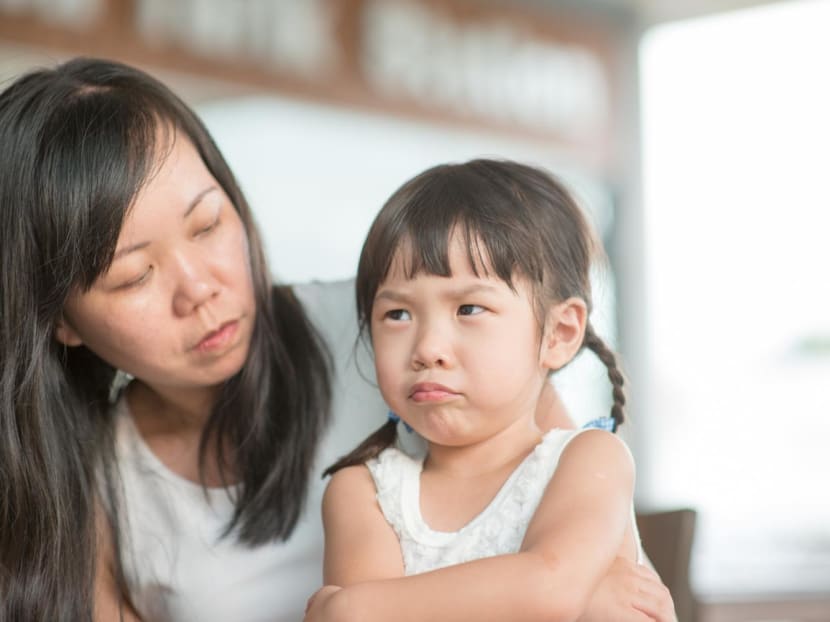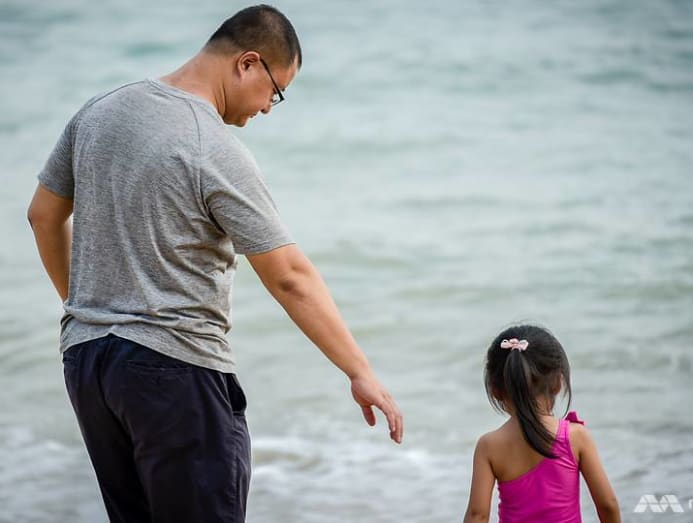Commentary: Raising children is hard enough without backseat parents judging every tantrum
Parents feel judged for their parenting skills and how they manage their children’s behaviour in public, and not even Kate Middleton was spared when a clip of Prince Louis went viral recently. Annie Tan says it’s unfair parents get slammed so quickly after one tantrum.

Child throwing a tantrum with parent (Photo: iStock/szefei)
SINGAPORE: At the British Platinum Jubilee Pageant earlier this month, four-year-old Prince Louis threw a tantrum that went viral. As his mother Kate Middleton spoke to him, he covered her mouth, turning to stick his tongue out and thumb his nose at her.
Some gushed over his cute antics. But others were quick to call out what they perceived to be brattish behaviour in a 20-second clip and slam his mother for failing to discipline her child.
Though I don’t care much about the UK royals, I can relate – as a parent – to both public tantrums and the social pressure of being judged for them.
According to a 2021 study by market research company Ipsos across 28 countries, 9 in 10 parents in Singapore with a child aged 17 and below old feel judged, with the child’s behaviour and how they are perceived to be managing the child’s behaviour given as top reasons globally.
Though parents have a responsibility to remind our children of appropriate behaviour in different social settings, they will find a way to go completely off-script. How many four-year-olds do you know have the attention span to sit through a long dinner, much less a two-and-a-half-hour Jubilee parade, without fuss?
And if the child is not inconveniencing anyone, why are people so quick to slam parents for it?
THE PROBLEM WITH SNAP JUDGEMENTS
It’s simply difficult to make accurate judgments off a five-minute glimpse of “bad” behaviour without enough context.
I remember when my daughter threw frequent tantrums while I was pregnant with my second child. My fairly independent two-and-a-half-year-old suddenly became extra clingy.
She would insist on sitting on my lap at dinner, squeezing my growing uterus and already compressed bladder. Late into my pregnancy, she frequently wanted me to carry her, occasionally having meltdowns when I did not have the energy to oblige.
On several occasions, well-meaning relatives and bystanders advised me to be harsher with her. But I knew my daughter was just struggling with new, confusing emotions.
Children’s health experts describe tantrums as a way that young children let out strong emotions before they can express those feelings in a socially acceptable way. They may be jealous, stressed, tired, hungry, cranky and need time to learn how to develop social awareness, emotional intelligence and self-control. Some children with special needs may also feel more easily overwhelmed.
While it is human nature to form judgements, it is not helpful to express them. Parents already have their hands and ears full with a bawling child and criticism or friendly suggestions add to the stress of the situation.

Sometimes, parents end up making decisions against their better judgement to shut down a tantrum. Parents I know confessed that social pressure has occasionally led them to censure children more harshly in public than intended, give in to the child’s whims or even whip out the iPad as a distraction, even though they know this could inadvertently reinforce bad behaviour.
And how parents respond to children helps them learn to process emotions. It generally takes time and patience, not simply threats and scolding, to make important lessons stick. In many cases, disciplining is often best done privately, especially for older children who may be conscious of how they are seen publicly.
WHEN PARENTS SHOULD BE MORE REACTIVE
But that is not to say that parents are immune to judgement, or that love for our children should blind us to their faults.
Two factors to consider when dealing with public tantrums are safety and basic consideration for others.
Making naughty faces like Prince Louis is completely different from a child running amok or throwing a violent tantrum and could hurt themselves or others, such as where hot food is served or where there are elderly passersby.
It falls on parents to remove the child or defuse the danger as quicky as possible. Outsiders may end up stepping in to prevent accidents, but this can be done in a neutral manner to focus on the dangerous behaviour and remind them someone else could get hurt.
It is also very different from deliberately disrespecting or hurting another person.
One recent example involved a teenage boy throwing a tray at a Sengkang coffee shop hawker. When the hawker retaliated by hitting him on the head with a ladle, his mother angrily confronted the hawker. While it can be argued that the hawker was wrong to respond with violence, surely the mother should not defend her child’s behaviour either.
Many of us might have observed cases of children hitting their helper or grandparents, with no attempt to stop the child or tell them this was wrong. In egregious cases, parents must be mindful of teaching the wrong lessons if nothing is done but no one will respond well to being scolded by a stranger.
One exception could be if the unruly child is hitting our own children. It is only natural to insist that parents rein in their child. Do our kids see us standing up for them and do they feel protected? Could expecting them to turn the other cheek to bullies or beat a hasty retreat discourage them from standing up for themselves in future?
There's a clear line between when another's parenting stops and our own parenting starts.
IMPOSSIBLE STANDARDS OF PERFECT PARENTING
In many other cases, it simply comes down to a difference in parenting styles.
Case in point: A friend of mine who lets her child play in the rain often finds herself admonished by aunties for endangering their health and making them more susceptible to the cold or even COVID-19. One even went so far as to accuse her of abuse, threatening to report her to the police.
Personally, I have also been told off by strangers for letting my now four-year-old play in the rain and taking my one-year-old out without a mask or face shield.
When it comes to perfect parenting, random strangers somehow feel entitled to an opinion: Are we too protective or not protective enough? Too involved or not involved enough? Too indulgent or too strict?
Perhaps the issue today is not that babies don’t come with instruction manuals, but that they come with too many manuals. Our elders share a mix of practical advice and old wives’ tales; whole sections of parenting guides endorse different approaches from free range and Montessori parenting to stern “tough love” and Tiger mums.
And then there’s the temptation of searching for answers on Google and parenting blogs that can bring more anxiety than reassurance.
Parents today are held to impossible standards. Let’s not forget that parents are also learning how to be parents – we won’t get every decision right.
So perhaps what we really need is to give parents the space to parent their own way, reserve unhelpful judgement and generally cut ourselves and others more slack. But parents should also maintain a sense of self-awareness to when our parenting style could end up intruding on other people’s lives.
Raising children is hard enough without backseat parenting.
Annie Tan is a freelance writer based in Singapore.












